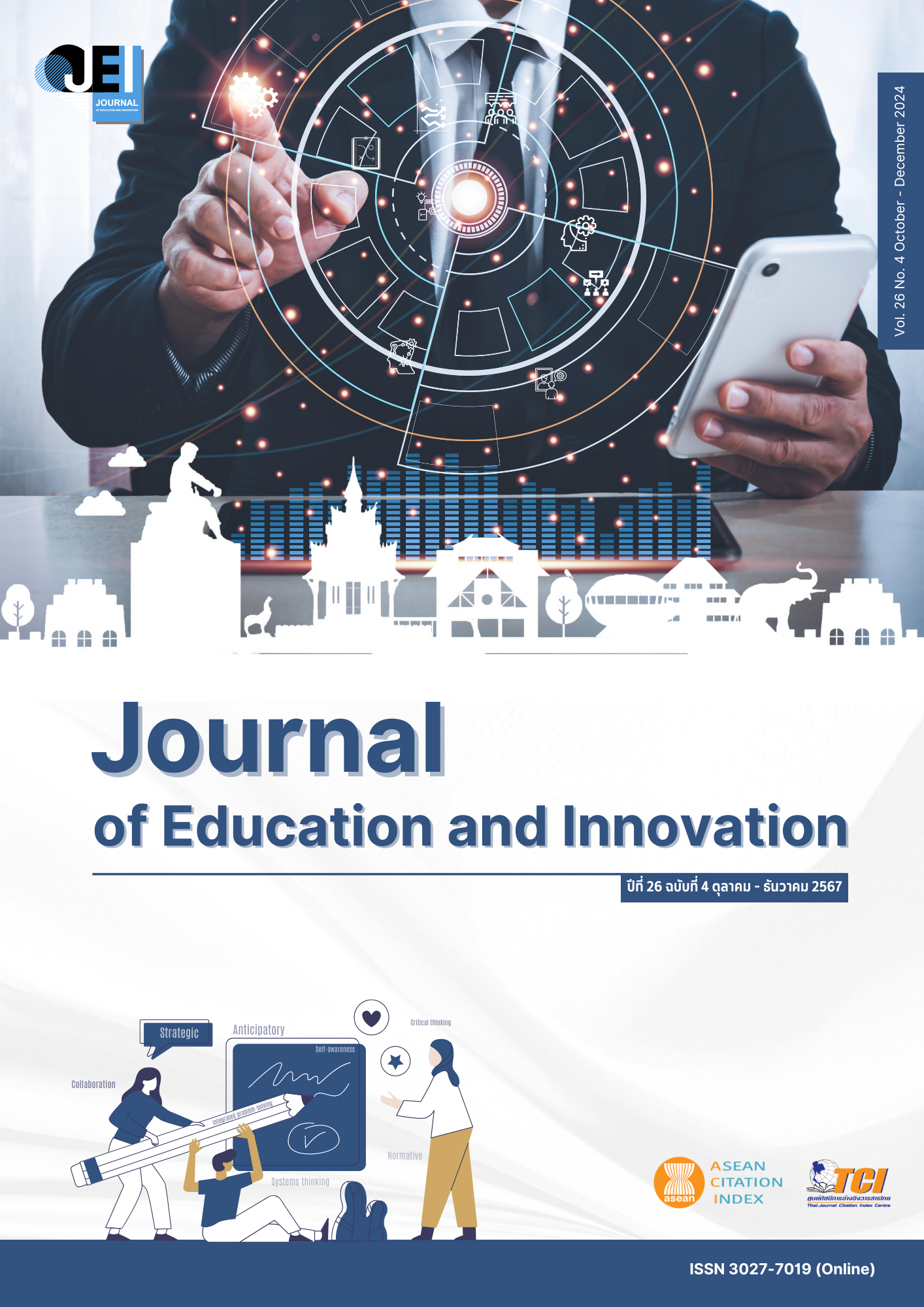MODEL FOR THE WHOLE SCHOOL APPROACH OF SCHOOL TO DEVELOP THE RESPONSIBILITY STUDENTS IN PRIMARY SCHOOL
Main Article Content
Abstract
This research aimed at developing model for the whole school approach of school to develop the responsibility students in Primary School. The research methodology had three phases: 1) Study component characteristics responsibility of the whole school approach of school to develop the characteristics responsibility Elementary school students from document and research. Using an interview form conduct a content analysis, from transcripts based on interview forms. 2) Create and checking of model for the whole school approach of school to develop the responsibility students in Primary School. Bring the data obtained from the study in step 1 to draft of model for the whole school approach of school to develop the responsibility students in Primary School, and conducted a group discussion from 9 experts to analyze the content. Then examined the draft of model, using the appropriate evaluation. Data were analyzed using statistics, arithmetic mean and standard deviation. 3) There was the evaluation of model for the whole school approach of school to develop the responsibility Elementary school students in accuracy, suitability, usefulness and possibility. Assessed by school administrators and teachers in educational institutions participating in the leader School of 3 schools, 1 of which were school administrators and 2 teachers in the total 9 persons. Data were analyzed using statistics, arithmetic mean and standard deviation. The findings were as follows: 1) The component analysis of the whole school approach of school to develop the responsibility Elementary school students of 4 components which were: Component 1: Educational Institution Management, Component 2: Learning Management, Component 3: Organizing Activities to Promote Learning, Component 4: Organizing community relations activities and participation of parents and communities. The components of the nature of 3 aspects of responsibility were self-responsibility, family responsibility, social responsibility. 2) Model which were: 1) Principles, 2) Objectives, 3) Components, and 4) Results. The result of examining the draft model for the whole school approach of school to develop the responsibility Elementary school students found that; the draft model was suitability at the highest level. 3) Model for the whole school approach of school to develop the responsibility Elementary school students were accuracy at a high level, suitability at the highest level, usefulness at the highest level and possibility at the highest level. The handbook of Model for the whole school approach of school to develop the responsibility Elementary school students overall of accuracy at the highest level, suitability at a high level, usefulness at the highest level and possibility at the highest level.
Article Details

This work is licensed under a Creative Commons Attribution-NonCommercial-NoDerivatives 4.0 International License.
The owner of the article does not copy or violate any of its copyright. If any copyright infringement occurs or prosecution, in any case, the Editorial Board is not involved in all the rights to the owner of the article to be performed.
References
Asawapoom, S. (2007). Using research to develop a thesis model doctoral level. Journal Ubon Ratchathani Rajabhat University, 2(2), 76-84
Equitable Education Fund. (2019). Teacher and school development projects to continually raise the level of education. Bangkok: Equitable Education Fund.
Kassaro, T., Supakan, P., Yotharak, M., & Krainara, S. (2021). A model management of students discipline activities enhancement in responsibility for students of schools cluster 1 under Nakhon Si Thammarat Primary Educational Service Area Office 3. Journal of Graduate MCU KhonKaen Campus, 8(3), 210-221.
Office of Academic Studies and Educational Standards. (2014). Guidelines for measuring and evaluating learning outcomes. According to the Basic Education Core Curriculum 2008. Bangkok: Ministry of Education.
Office of the Basic Education Commission. (2013). School administration manual in the juristic person management development project. Bangkok: The Agricultural Cooperative Federation of Thailand.
Office of the Secretariat of the Education Council. (2018). Model research and development mechanisms for strengthening discipline in educational institutions at the basic education level responsibility and punctuality. Bangkok: Ministry of Education.
Panich, V. (2012). How to create learning for students in the 21st century. Walailak Journal of Learning Innovations, 1(2), 3–14.
Pathumrat, T. (2013). The model for efficient administration of small-sized schools (Doctoral dissertation). Ubon Ratchathani: Ubon Ratchathani Rajabhat University.
Sammonds, P., Hillman, J., & Mortimore, P. (1995). Key characteristics of effective schools: A review of school effectiveness research. London: Institute of Education.
Sirisoponpiwat, S. (2017). Developing model for enhancing responsibility values of prathomsuksa 5 students (Doctoral dissertation). Maha Sarakham: Mahasarakham University.
Waiyarat, S. (2013). A participative education management model enhancing learning quality of primary school children within the office of the Basic Education Commission in Northeast Thailand (Doctoral dissertation). Bangkok: Eastern Asia University.
Worawutbuddhapongs, P. (2010). Multimedia development for self - control in promoting the youths’ responsibility behavior in studying (Master thesis). Chiang Mai: Chiang Mai University.


